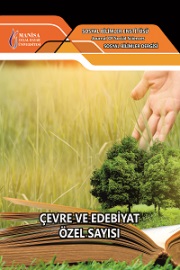Mnemonic Agency of Water in the Anthropocene: Material and Discursive Entanglements in Emmi Itäranta’s Dystopian Cli-Fi Novel Memory of Water
Mnemonic Agency of Water in the Anthropocene: Material and Discursive Entanglements in Emmi Itäranta’s Dystopian Cli-Fi Novel Memory of Water
Author(s): Fatma AykanatSubject(s): Ancient World, Novel, Turkish Literature, Human Ecology, Environmental interactions
Published by: Celal Bayar Üniversitesi Sosyal Bilimler Enstitüsü
Keywords: water; the Anthropocene; memory; agency; dystopia; eco-fiction; Cli-Fi;
Summary/Abstract: Under the contemporary ecological threats and human-induced environmental transformations observed in the Anthropocene, water has turned into an irreplaceable natural resource and a valuable asset for human survival. More alarmingly, scarcity of water has been expected to be more severe in the near future, and cause global scale water wars over the possession of it involving many countries. Within a New Materialist theoretical framework, this study, which is based on the ecocritical analysis of Emmi Itäranta’s Cli-Fi novel Memory of Water (2014), treats water as an agential nonhuman element with the capacity to change the morphology of its surroundings as well as having a consciousness enabling water to store “in its memory everything that’s ever happened in this world” (Itäranta 90), both literally and metaphorically. Literally, absorbing the toxic chemicals released by various human activities nearby, water gets contaminated by humans. Its unnaturally changed colour reveals the responsibility of the humans in this contamination. In a similar way, metaphorically, water remembers what has been “done” to it by humans. In this respect, this study argues that water has a mnemonic narrative agency combining human memory and environmental memory. Although water is a vital natural resource for human beings, it is also an independent environmental force that will never yield to man-made chains, as Emmi Itäranta highlights in Memory of Water (2014). Water can never be possessed by humans; it belongs to everyone and to no one. In Memory of Water (2014), Itäranta envisions a dystopic future –The Twilight Century- challenged by global warming, melting ice-caps, shortage of fresh water, and dominated by water criminals, strict water quotas, illegal water pipes, water guards, black markets, toxic plastic graves, water-related illnesses, and military and political power holders trying to monopolise the remaining fresh water reserves through fear and violence. Although it is not customary for the tea masters to accept women as apprentices, the seventeen-year-old female protagonist of the novel, Noria, is unconventionally trained by her father Master Kaitio to be a tea master; the watcher of water as well as its servant. In such an apocalyptic future, when scarcity of water reconfigures all prevailing discursive formations, Noria tries to survive, to make crucial decisions, and most importantly, to tell herstory as a female voice raised against the history written by the suppressive patriarchal forces. At that point, the memory of water as a versatile, unyielding nonhuman element, and the human memory of a tea master, the watcher of water, are entangled.
Journal: Celal Bayar Üniversitesi Sosyal Bilimler Dergisi
- Issue Year: 16/2018
- Issue No: Special
- Page Range: 1-26
- Page Count: 26
- Language: English

